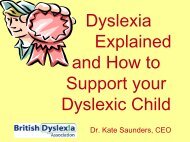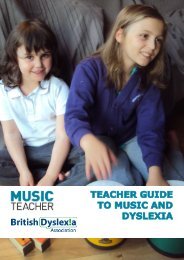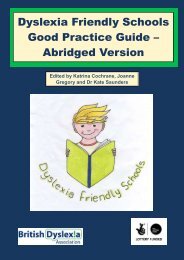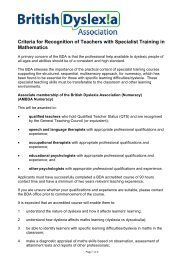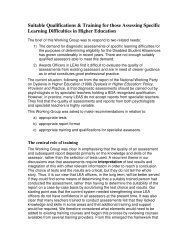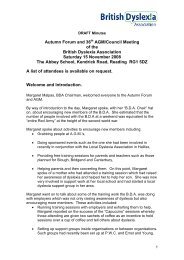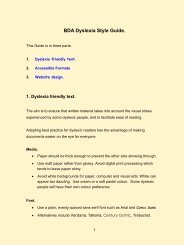Intervention for Dyslexia - The British Dyslexia Association
Intervention for Dyslexia - The British Dyslexia Association
Intervention for Dyslexia - The British Dyslexia Association
Create successful ePaper yourself
Turn your PDF publications into a flip-book with our unique Google optimized e-Paper software.
3 UK intervention studies<br />
3.1 Stages of intervention in England<br />
<strong>The</strong> tiers of intervention used in the USA roughly correspond to what are called ‘waves’<br />
in England. ‘Wave 1’ refers to the initial teaching of literacy in schools in which there<br />
should be effective inclusion of all children in a daily and high quality literacy hour with<br />
appropriate differentiation where required (DfES, 2003). However, if children do not<br />
respond appropriately to initial classroom literacy instruction, then intervention becomes<br />
necessary. Wave 2 describes specific, additional and time-limited interventions provided<br />
<strong>for</strong> some children who need help to accelerate their progress to enable them to work at<br />
or above age-related expectations. Primary National Strategy programmes such as Early<br />
Literacy Support or Springboard would be regarded as Wave 2 interventions. Wave 3<br />
describes targeted provision <strong>for</strong> a minority of children where it is necessary to provide<br />
highly tailored intervention to accelerate progress or enable children to achieve their<br />
potential. This may include 1:1 or specialist interventions, and, where older children are<br />
concerned, usually refers to specifically targeted approaches <strong>for</strong> children identified as<br />
requiring SEN support (on School Action, School Action Plus or with a Statement of<br />
Special Educational Needs) (DfES, 2003). Probably the best-known example of a Wave 3<br />
intervention is Reading Recovery (see Chapter 5), but there are other popular<br />
programmes, such as Catch Up Literacy, 6 and Sound Linkage (Hatcher, 2000a). 7 All<br />
three of these programmes are normally delivered 1:1, but none is designed specifically<br />
<strong>for</strong> dyslexic pupils. Reading Recovery is generally given to children between the ages of<br />
5 years 9 months and 6 years 3 months, and although Catch Up and Sound Linkage are<br />
both intended primarily <strong>for</strong> use in Years 1–3, they could be used at any time between<br />
the ages of 6 and 14 and hence might be regarded as secondary or even tertiary<br />
interventions according to the children involved.<br />
3.2 Rationale <strong>for</strong> the selection of studies<br />
As with the review of intervention studies carried out in the USA and elsewhere in the<br />
world (see Chapter 2) only UK programmes and studies that have a strong emphasis on<br />
phonological skills are considered here, <strong>for</strong> reasons explained in the Introduction (see<br />
Section 1.1). Brooks (2007) has reviewed UK intervention studies <strong>for</strong> children with<br />
literacy difficulties in considerable detail. Fawcett (2002a) has also reviewed traditional<br />
phonologically based interventions. Fourteen teaching programmes that had been the<br />
subject of UK intervention studies were found by Brooks (2007) to have a major focus<br />
on phonological skills <strong>for</strong> reading, and there<strong>for</strong>e may be considered of potential benefit<br />
to children with dyslexia. Almost all of these were found by Brooks to be effective and,<br />
although few of the studies specifically targeted children with identified dyslexia (see<br />
Table 6), most were carried out with pupils who were on the SEN register and/or whose<br />
literacy development was substantially behind expected levels. It is there<strong>for</strong>e extremely<br />
6 http://www.catchup.org.uk/pages/home.shtm<br />
7 Sound Linkage also <strong>for</strong>ms the basis of the Cumbria Reading <strong>Intervention</strong> programme<br />
[http://www.cumbria.gov.uk/childrensservices/reading/default.asp].<br />
<strong>Intervention</strong> <strong>for</strong> <strong>Dyslexia</strong> 55



